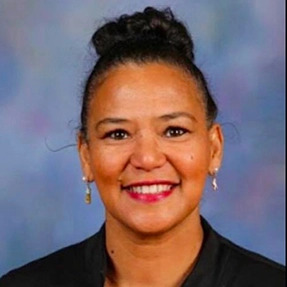What do you do now for a job? What does it entail?
I work as a school chaplain at two schools, which are primary and high schools.
I work as part of the wellbeing team along with the social worker/wellbeing manager.
My role entails arranging and doing wellbeing activities at school as per my own initiatives or via our school principal. This is for students, staff as well as for parents and carers.
I have one-on-one or group sessions with children and assist them with their mental wellbeing.
Students have various needs in schools and we assist them case by case. I have to do mandatory reporting when a child discloses things that we identify as “at risk”. I support students via phone and online during covid lockdowns.
One of the things I enjoy doing is having parent group sessions and teaching them about cyber safety for their children, such as the appropriate age children should be to play certain games or download apps and making them aware of the dangers online the children are vulnerable to.
Many of them are not aware of the dangers.
I volunteer at Melbourne Airport as a chaplain. I have paused now since covid as it is too risky working in schools and being at the airport.
Why did you start thinking of learning more about, and working in, cybersec?
Three reasons really.
(1) I am aged in my 40s and I thought it was time to upskill in something I would enjoy and also something I could be really good at. I think if you are really good at your job, age won’t be a factor when being hired. I want to work for as long as I am able to and I do not want my age to stop me in interviews from getting a great place to work at. Cyber security won me over as a great skill to have.
(2) When I went back to South Africa in 2014 for a year, I volunteered with Missing Children South Africa. It was there that I learned that a child goes missing in South Africa every 5 hours. I was shocked to learn that the dark web was one of the places people were trading children. The more I learned more about it, the more I realised that I want to be someone who can make a difference for them.
When the criminals use tech for crimes to kids, we - the good people - need to skill ourselves with the skills they have and help stop their crimes.
(3) As a mum, I think the wages will be great to look after my daughter and myself better.
How have you set about getting qualified in cyber security?
I have thus far completed a Cert IV in Cybersecurity though Box Hill Institute. I studied part time as I work full time.
I have completed the Cyber Leadership Program, which I was blessed to receive a scholarship for.
It is excellent in that it provided me with the skills for the future in the role of a CISO.
I furthermore completed the Executive Cyber Resilience Program, also through the Cyber Leadership Program.
I completed a short course in Cyber Warfare and Terrorism through Charles Sturt University. I am currently participating in the 2021 WiCys SANS Security Training Scholarship and have made it to stage 2 of the five stages.
I would like to in the future complete a Masters in Cybersecurity
What area of cyber security are you most interested in?
I am most interested in incident response and forensic analysis.
How do you intend on applying your new cyber security skills?
I intend working in the industry where I am able to use my cyber security as well as my soft skills attained as a chaplain and wellbeing officer.
My goal is to work in the cyber secuirty field and volunteer my after-hours time to help organisations who fight child sex trafficking with the tools to find children and their perpetrators.
I would like to equip the rescue teams who do the physical rescues with the technical knowledge and tools to ensure their rescues are successful and the traffickers don't have ways to track them.
In learning about security, what surprised you or had the biggest impact?
The biggest impact for me was how women in the industry support each other. I have found the ladies from AISA, AWSN as well as the ladies from the Project Friedman project, Women Speak Cyber, to have supported me, taught me, and welcomed me in this cyber security space.
I was surprised to learn how vast the options for career choices are in cyber security and also how many people just like me have decided to change career paths even though the industry they are in are completely different.
If you could make people understand just one thing about cyber security, what would it be?
I think it would be that we need to teach children about cyber safety from a young age as they are growing up in an online world, especially with COVID forcing us all to be more online than ever.
The other thing is that I would tell people that cyber security is not a separate thing that is scary and that you have major special skills to get into.
It is so intermingled in everything we do. Through procurement, we have to ensure our suppliers selling IoT devices and other products are following the appropriate security parameters right up to us personally buying globes or toys for home that could easily be hacked.
Cyber security is part of a safe living.
 *Annette Peploe is presenting at the 2021 Australian Cyber Conference (Cybercon) Virtual Edition, which is being staged November 15-17.
*Annette Peploe is presenting at the 2021 Australian Cyber Conference (Cybercon) Virtual Edition, which is being staged November 15-17.